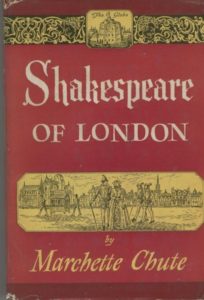Say you’re reading an article on literary criticism, and you spot an almost easy-to-overlook aside: “For example, no one has really explained William Shakespeare like Marchette Chute did in 1947.” The reference is to a book she wrote, Shakespeare of London, and it was published in 1950, not 1947. But it was high praise indeed.
You ask yourself, “How is that possible? How is a biography of Shakespeare published 70 years ago better than anything more recent? We have so much more research, so many more historical and literary studies, so much more information. And we have the internet. How could someone make a statement like that?”
They were able to make the statement because it’s true. Shakespeare of London has been long out of print, but it is still a classic, and you can still find used copies via sources like Amazon and Alibris. My copy, obtained through an Amazon affiliate, is the original paperback edition published in 1950. It cost all of $2 and is in surprisingly good condition. (A used hardback edition costs considerably more, as in hundreds of dollars.)
The fact is that we actually don’t know more, or much more, about Shakespeare in 2020 than what was known in 1950. We have a multitude of interpretative studies, largely reflecting changing fads and fashions in university English departments. We have many different ways of considering the man and his work. But we don’t really know much more about the facts of his life than what was known in 1950.

As Chute discovered that a lot of what was known about Shakespeare was myth, hearsay, and sometimes invented out of whole cloth, she utilized contemporary records almost exclusively. Consulting thousands of sources, she looked at everything she could find—land and church records, legal filings, official play folios, broadsides, poems written by others, accounts of theater visitors, and more.
Chute took that mountain of contextual and factual information from the times the man lived in and created an engaging, readable, and interesting account of Shakespeare’s life. She includes his life in both Stratford and London, the lives of his parents, and what happened with his children. The primary focus is London and the theater (including how it managed through and survived two rounds of the bubonic plague).
If there was a single factor which stood out as decisive in the popularity of his plays, it was his continuing to be an actor long after most playwrights retreated to the writing desk. He continued to act until at least 1603. Acting was not for the faint-hearted or the unathletic. Not only did the actor have to remember his lines and convincingly act; he was often called upon to jump from stage windows, engage in fencing and swordfights, feign the loss of limbs, and more. But by remaining an actor, Shakespeare kept in direct touch with what was important to audiences, and what worked (and didn’t) on stage.

Marchette Chute
Chute also pays considerable attention to the sources Shakespeare used. Most of us are familiar with his reliance on Plutarch’s Lives of the Noble Greeks and Romans and Raphael Holinshed’s Chronicles. But I didn’t know that Romeo and Juliet was based on a really bad narrative poem. To create the play he did by using, and overcoming, some really bad material demonstrates the playwright’s genius.
Chute’s biography is filled with these kinds of insights. Her use of sources is so vast that she acknowledges in the introduction that she had not included most of them in the bibliography, which would make it longer than the text. But by emphasizing the detail of the everyday, her narrative brings Shakespeare the man to full realization.
A native of Minnesota, Chute was considered a significant writer in her lifetime and was elected to the American Academy of Arts and Letters. She also published Geoffrey Chaucer of England (1946), An Introduction to Shakespeare (1951), Ben Jonson of Westminster (1953), and Two Gentlemen: A Dual Biography of George Herbert and Robert Herrick (1959), among several other books. She also wrote children’s stories and poems. She died in 1994 in New Jersey.
Shakespeare of London, a forgotten classic, is still an excellent biography and introduction to the man and his plays. It may be out of print, but it remains one of the most insightful works we have on Shakespeare.
Photo by JOP-76, Creative Commons, via Flickr. Post by Glynn Young.
__________________________

“I require all our incoming poetry students—in the MFA I direct—to buy and read this book.”
—Jeanetta Calhoun Mish
- Poets and Poems: Donna Vorreyer and “Unrivered” - October 7, 2025
- Poet Sidney Lanier and the Lost Cause - October 2, 2025
- Poets and Poems: A.J. Thibault and “We Lack a Word” - September 30, 2025

L.L. Barkat says
Fascinating. I passed this along to Sara, who I think will be delighted by it. 🙂
Glynn says
I’m learning there are a lot of wonderful old and not-so-old books like this, waiting to be rediscovered.
Bethany R. says
What a fabulous resource you’ve highlighted! Thank you for this recommendation. Could definitely come in handy during the school year (or in the summer, just for fun). I’d also like to check out her children’s book you linked to, The Wonderful Winter.
Sandra Heska King says
You mean you didn’t spring for the $905 hard cover?
So interesting that she limited her research. Shakespeare would have no clue how important his works would be hundreds of hears after his death.